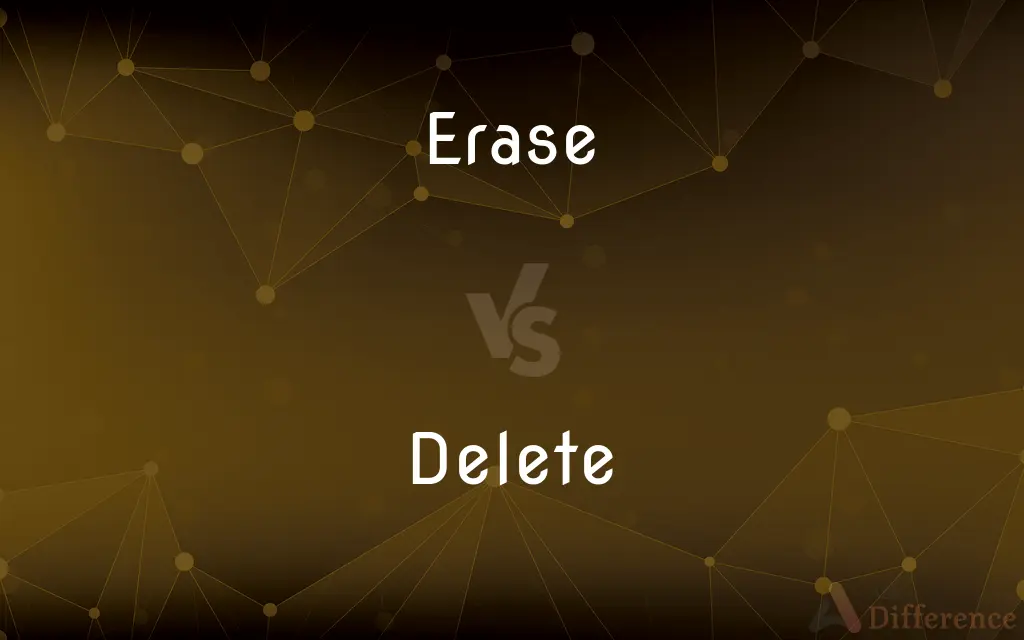Erase vs. Delete — What's the Difference?
By Tayyaba Rehman & Maham Liaqat — Updated on April 25, 2024
Erase refers to removing marks or data less formally, often implying physical or superficial cleaning, while delete specifically means removing digital data or files permanently.

Difference Between Erase and Delete
Table of Contents
ADVERTISEMENT
Key Differences
Erase often implies removing something written, drawn, or recorded, typically from a surface or medium, like erasing pencil marks from paper. On the other hand, delete is used specifically in digital contexts to refer to the permanent removal of data from a computer or digital storage system.
Erase can also suggest a less permanent or less thorough removal, such as erasing a chalkboard, where traces might remain. Whereas delete in digital terms often implies that the data will not be easily recoverable, emphasizing a more definitive action.
The term erase is applicable in various contexts, from physical to metaphorical, suggesting the removal of memories or conditions, as in erasing doubt. Conversely, delete is almost exclusively technical, lacking such metaphorical uses.
In usage, erase comes from the old French word 'esraser', meaning to scrape off, reflecting its broader and sometimes physical nature of removing. In contrast, delete derives from the Latin 'deletus', past participle of delere, meaning to destroy, focusing on its digital and destructive connotation.
While erase is often used in both spoken and written English in a variety of settings, delete is commonly used in computing and official communications about data management, emphasizing its specialized usage.
ADVERTISEMENT
Comparison Chart
Context
Both physical and metaphorical
Predominantly digital
Permanence
Often less permanent
Typically permanent
Recovery
Possible in many cases
Usually not easily recoverable
Etymology
From Old French 'esraser'
From Latin 'deletus'
Common Usage
Broad, including everyday speech
Specialized, mainly technical
Compare with Definitions
Erase
To rub or scrape out, as letters written with pencil.
She erased the incorrect answer on her quiz.
Delete
To eliminate text from a document.
The editor deleted the paragraph that contained errors.
Erase
To destroy or remove data from memory or a storage device.
He erased the old backups from the hard drive.
Delete
To cancel or remove an entry in a list or database.
He deleted the outdated contact from his phone.
Erase
To remove any trace of; obliterate.
The new policy erases the old regulations.
Delete
To remove or obliterate written or printed matter, especially by drawing a line through it or marking it in some way.
She deleted the sentence from her essay.
Erase
To eliminate completely; remove all signs or traces.
The storm erased the footprints on the beach.
Delete
To remove data from a computer's memory or storage.
Delete those unnecessary files to free up space.
Erase
To clear a surface by removing what was previously there.
He erased the whiteboard for his next class.
Delete
To expunge information, making it irrecoverable.
She deleted her account on the website.
Erase
(computing) The operation of deleting data.
Delete
Remove or make invisible;
Please delete my name from your list
Erase
To rub or scrape out, as letters or characters written, engraved, or painted; to efface; to expunge; to cross out; as, to erase a word or a name.
Delete
Cut or eliminate;
She edited the juiciest scenes
Erase
Wipe out magnetically recorded information
Delete
To cancel, strike out, or make impossible to be perceived
Deleted the expletives from the transcript with a marker.
Erase
To remove (something written, for example) by rubbing, wiping, or scraping.
Delete
To remove from a document or record
Deleted the names from the computer file.
Erase
To remove (recorded material) from a magnetic tape or other storage medium
Erased a file from the hard drive.
Delete
To remove (a file, for example) from a hard drive or other storage medium.
Erase
To remove recorded material from (a magnetic tape or disk, for example)
Erased the DVD.
Delete
To remove, get rid of or erase, especially written or printed material, or data on a computer or other device.
Erase
To remove all traces of; eliminate or obliterate
Had to erase all thoughts of failure from his mind.
Delete
To defeat or dominate.
Erase
(transitive) to remove markings or information
I erased that note because it was wrong.
Delete
To kill or murder.
Erase
(transitive) To obliterate information from (a storage medium), such as to clear or (with magnetic storage) to demagnetize.
I'm going to erase this tape.
Delete
(computing) A deletion.
Erase
(transitive) To obliterate (information) from a storage medium, such as to clear or to overwrite.
I'm going to erase those files.
Delete
(recorded entertainment industry) A remainder of a music or video release.
Erase
To remove a runner from the bases via a double play or pick off play
Jones was erased by a 6-4-3 double play.
Delete
(uncountable) Delete
Erase
(intransitive) To be erased have markings removed, have information removed, or be cleared of information.
The chalkboard erased easily.
The files will erase quickly.
Delete
(computing) The delete character (U+007F or %7F).
Erase
(transitive) To disregard (a group, an orientation, etc.); to prevent from having an active role in society.
Delete
To blot out; to erase; to expunge; to dele; to omit.
I have, therefore, . . . inserted eleven stanzas which do not appear in Sir Walter Scott's version, and have deleted eight.
Erase
Fig.: To obliterate; to expunge; to blot out; - used of ideas in the mind or memory.
Delete
Wipe out magnetically recorded information
Erase
Remove from memory or existence;
The Turks erased the Armenians in 1915
Erase
Remove by or as if by rubbing or erasing;
Please erase the formula on the blackboard--it is wrong!
Common Curiosities
How do erase and delete differ in everyday language?
Erase is used more broadly and can be applied physically or metaphorically, while delete is primarily used in digital contexts.
Is it better to delete or erase data for security?
For digital data, deleting is generally more secure, as it often means removing the data entirely, whereas erasing might not be as thorough.
What does it mean to delete a file?
Deleting a file means to permanently remove it from a computer or digital storage, making it generally irrecoverable.
What tools are used for erasing?
Tools like erasers, cloths, and scrubbers are used for physical erasing, while software tools are used for erasing digital data.
What happens when you delete a file from a recycle bin?
Deleting a file from the recycle bin generally removes it from the computer's file system, making recovery harder.
Can I erase something temporarily?
In physical contexts, like using a pencil, erasing can sometimes be temporary, as residues might still be visible.
Are there any environmental concerns with deleting digital data?
Deleting digital data itself doesn’t have direct environmental impacts, but the electronic waste generated from obsolete storage media can be a concern.
What does it mean to erase something?
To erase means to remove or obliterate visible signs of something, either physically from a surface or metaphorically from memory.
Can erased data be recovered?
Depending on the method and context, erased data, especially non-digital, can often be recovered or may leave traces.
How do you ensure data is deleted permanently?
Using specialized software designed to overwrite data multiple times ensures it is deleted permanently.
Can delete be used in a non-digital context?
Although uncommon, delete can be used metaphorically in non-digital contexts to imply removing something effectively.
What is the digital equivalent of an eraser?
Software tools that overwrite or remove data are considered digital equivalents of physical erasers.
What are the risks of not deleting sensitive information properly?
Not properly deleting sensitive information can lead to data breaches or unauthorized access to personal or confidential data.
Why is it important to erase something completely?
Completely erasing something can prevent unauthorized use or reproduction of sensitive information, whether personal or professional.
How do erase and delete affect memory in devices?
Erasing may free up memory temporarily or incompletely, while deleting generally frees up memory more thoroughly and permanently.
Share Your Discovery

Previous Comparison
Dumpster vs. Skip
Next Comparison
Told vs. TaughtAuthor Spotlight
Written by
Tayyaba RehmanTayyaba Rehman is a distinguished writer, currently serving as a primary contributor to askdifference.com. As a researcher in semantics and etymology, Tayyaba's passion for the complexity of languages and their distinctions has found a perfect home on the platform. Tayyaba delves into the intricacies of language, distinguishing between commonly confused words and phrases, thereby providing clarity for readers worldwide.
Co-written by
Maham Liaqat













































